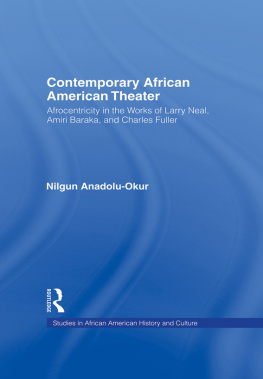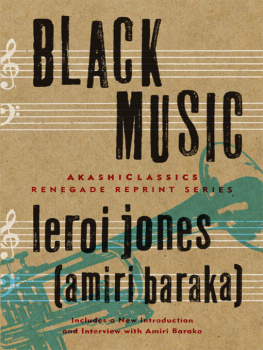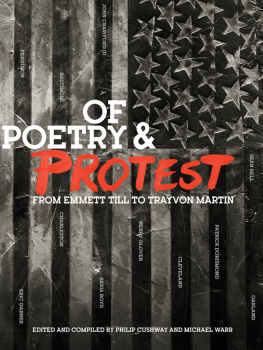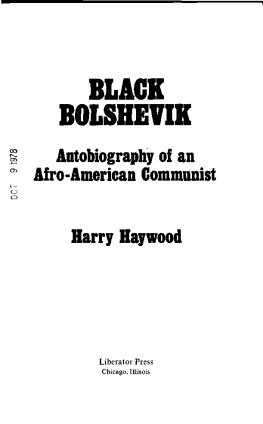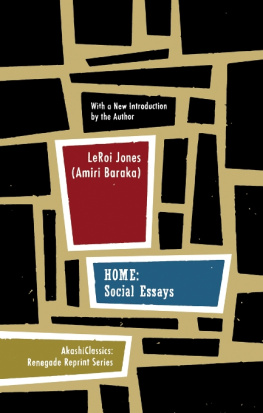Baraka Imamu Amiri - Amiri Baraka: the politics and art of a black intellectual
Here you can read online Baraka Imamu Amiri - Amiri Baraka: the politics and art of a black intellectual full text of the book (entire story) in english for free. Download pdf and epub, get meaning, cover and reviews about this ebook. City: New York, year: 2001, publisher: New York University Press, genre: Politics. Description of the work, (preface) as well as reviews are available. Best literature library LitArk.com created for fans of good reading and offers a wide selection of genres:
Romance novel
Science fiction
Adventure
Detective
Science
History
Home and family
Prose
Art
Politics
Computer
Non-fiction
Religion
Business
Children
Humor
Choose a favorite category and find really read worthwhile books. Enjoy immersion in the world of imagination, feel the emotions of the characters or learn something new for yourself, make an fascinating discovery.

- Book:Amiri Baraka: the politics and art of a black intellectual
- Author:
- Publisher:New York University Press
- Genre:
- Year:2001
- City:New York
- Rating:3 / 5
- Favourites:Add to favourites
- Your mark:
- 60
- 1
- 2
- 3
- 4
- 5
Amiri Baraka: the politics and art of a black intellectual: summary, description and annotation
We offer to read an annotation, description, summary or preface (depends on what the author of the book "Amiri Baraka: the politics and art of a black intellectual" wrote himself). If you haven't found the necessary information about the book — write in the comments, we will try to find it.
Amiri Baraka: the politics and art of a black intellectual — read online for free the complete book (whole text) full work
Below is the text of the book, divided by pages. System saving the place of the last page read, allows you to conveniently read the book "Amiri Baraka: the politics and art of a black intellectual" online for free, without having to search again every time where you left off. Put a bookmark, and you can go to the page where you finished reading at any time.
Font size:
Interval:
Bookmark:
Thank you for buying this ebook, published by NYU Press.
Sign up for our e-newsletters to receive information about forthcoming books, special discounts, and more!
Sign Up!
A publisher of original scholarship since its founding in 1916, New York University Press Produces more than 100 new books each year, with a backlist of 3,000 titles in print. Working across the humanities and social sciences, NYU Press has award-winning lists in sociology, law, cultural and American studies, religion, American history, anthropology, politics, criminology, media and communication, literary studies, and psychology.
AMIRI BARAKA
JERRY GAFIO WATTS
The Politics and Art of a Black Intellectual

For Traci Cassandra West
life companion
NEW YORK UNIVERSITY PRESS
New York and London
2001 by New York University
All rights reserved
Grateful acknowledgment is made to Amiri Baraka and to the
Sterling Lord Agency for permission to reprint excerpts from Barakas
works. The New York Public Library is acknowledged for permission
to use the LeRoy McLucas photograph of Baraka on the cover.
Library of Congress Cataloging-in-Publication Data
Watts, Jerry Gafio.
Amiri Baraka : the politics and art of a Black intellectual / Jerry
Gafio Watts.
p. cm.
Includes bibliographical references and index.
ISBN 0-8147-9373-8
1. Baraka, Imamu Amiri, 1934Political and social views.
2. Politics and literatureUnited StatesHistory20th century.
3. Baraka, Imamu Amiri, 1934 Criticism and interpretation.
4. African AmericansPolitics and government. 5. African
AmericansIntellectual life. 6. BlacksPolitics and government.
7. African Americans in literature. 8. BlacksIntellectual life.
9. Blacks in literature. I. Title.
PS3552.A583 Z93 2001
818.5409dc21 2001002006
New York University Press books are printed on acid-free paper,
and their binding materials are chosen for strength and durability.
Manufactured in the United States of America
10 9 8 7 6 5 4 3 2 1
Like my first book, this volume has its origins in my dissertation. I had the great fortune to study political science at Yale University during the late 1970s and early 1980s. The political science department gave me the freedom to engage my humanist sensibilities, an act of intellectual toleration that went against the prevailing tendencies in the discipline. I want to thank my committee of Robert Lane, Juan Linz, and particularly David Apter, the chairman, for helping guide a confused graduate student through the bureaucracy of academia and doing so in a way that provided the space for me to follow my curiosity. In addition, I benefited from the intellectual generosity of Douglas Rae, James Scott, Stanley Greenberg, and the late Philip White.
While writing this work, I received encouragement and intellectual support from many friends and acquaintances, including associates from my Yale days: Horace Porter, Carla Carr, Frank Gonzales, Randall Kennedy, Adolph Reed, Eileen Hormel, Angelo Messore, Rabbi Arnold Wolfe, Marcus Bruce, Eugene Rivers, Henry Louis Gates, Norris Sakwe-Mante, Isabelle Gunning, Mary Davis, Deborah King, and the late Carl Price. I also benefited from my association with Kathy Rees, Larry Jackson, Helura Lyle, Tanya Green, Paul Kumar, Kris Graves, Eric Greene, Ethan Flad, Eve Goldberg, Fred Montas, Natalie Difloff, Joy Anderson, Nina Karnovsky, Steve Vacarro, Lisa Freeman, Alford Young, Carla OConnor, Amy Randall, Beau Dunning, Josh Freely, L.T., Maureen Kay, Tanya Jones, Denise Burgher, the Whitters family, and former Wesleyan colleagues: Robert OMeally, Peter Marx, Georgie Leone, Barbara Craig, Steven Gregory, Michael Harris, Ollie Holmes, Clarence Walker, Marshall Hyatt, Nat and Erness Brody, Alex Dupuy, Richard Williams, Robert Wood, and Mary Ann Clawson. Lee Siegels unsolicited close reading of a very early version of this manuscript was a true gift. Dan Clawson and Gerald Gill have been two constant sources of encouragement and sanity. To Pop Kantor in Norfolk, I owe a special thanks for supplying me with good bourbon and good books. For almost three decades David Evans has helped me stay grounded. To Martin Kilson I owe a debt of immense gratitude for the time, energy, and spirit he has invested in me for a quarter century. Jackie Lindsay was there at the beginning. Melvin Fowler, E. J. Davis, and Melvin Maddox were inexhaustible suppliers of good conversation. Emma Ketteringham and Amy Randall remain foundational, though my behavior doesnt show it. Ashley Hammarth, Erin Blakeley, Roberta Gold, Jill Kantor, Stephanie Mandell, and Sandy Sydlo persist as soulmates. Although I can do without Mandells terrible jokes, I do miss her. During the writing of this book, Lisa and Steve, Al and Carla, Kris and Fred and Joy have added new members to the American intellectual community. Congrats!
I want to thank supportive Trinity colleagues: Vijay Prashad, Raymond Baker, Joan Hendrick, Susan Pennybacker, Berel Lang, Steve Valocchi, Carol Clark, Renny Fulco, Laurie Waite, Noreen Channels, Hugh Ogden, Clinton Bailey, Dave Winer, Jack Chatfield, Stephanie Chambers, Peter Burns, Wally Swist, Maryam Elahi, Cheryl Greenberg, Ronald Spencer, Dianne Zannoni, and, gone but not forgotten, Lynn Tallit, Naomi Amos, Jeffrey Melnick, Van Gosse, Maurice Jackson, Jack Waggett, Hank Lewis, and Salim Washington. Different as night and day, Johnny Williams and Margo Perkins have added humor, vitality, and a healthy dose of skepticism to my life at Trinity. Judy Moran is the only known spirit-replenishing mathematician. Barbara Sicherman and Dina Anselmi have been two of Trinitys gifts to my life. Dear and special friends, Barbara and Dina have tried to keep me whole through their humor, generosity, and critical introspection. Both have taught me a great deal about the expansiveness and intimacy of friendship. Whereas Barbara has a knack for expecting answers to endless questions about things of great and minor significance, Dina is the only person that I know who enjoys, more than I do, baiting people into arguments over minutia. Barb, I cant remember! Dina, you win! With love, I celebrate the deviance of both women. Manijeh Zavareei, a kind, decent, and thoughtful colleague who died far too prematurely, will always be remembered for, among other things, trying to teach me how to write my name in Farsi.
My immediate and extended families have always supported my intellectual ambitions. I want to thank Maria and James Watts, my mother and father, for the love they have always given me. I also give them credit for my various neuroses. I have been blessed to have my brothers James and Robert; my sister Brenda, and my nephews Jim, Gregory, and Michael. I also want to thank my in-lawsBil Wright, Jean Powell Watts, Beckett Logan, Robynne West, Richard Perkins, Karen Amore and Estelle Amore, my main man Kyle, and Ravae, my favorite and very special niece. My late Uncle James and Aunt Sally were always among my most avid supportersas is my Aunt Julia. Paula Wests spiritedness will never be forgotten.
Cornel West, Werner Sollors, Traci C. West, Gerald Hudson, Michelle Wallace, Martin Luther Kilson, Farah Griffin, and James A. Miller have significantly informed my view of Baraka. Miller, a former Trinity College colleague, will probably reject most of the findings and arguments in this book. Because of that as well as his friendship with Baraka, I threatened to write here: Jim Miller has been singularly responsible for shaping all the assessments contained within. Jokes aside, I could not have written this book without the writings of Werner Sollors, Kim Benston, Henry Lacey, Houston Baker, William J. Harris, David Smith, Lloyd Brown, Harold Cruse, Theodore Hudson, and Komozi Woodard.
Next pageFont size:
Interval:
Bookmark:
Similar books «Amiri Baraka: the politics and art of a black intellectual»
Look at similar books to Amiri Baraka: the politics and art of a black intellectual. We have selected literature similar in name and meaning in the hope of providing readers with more options to find new, interesting, not yet read works.
Discussion, reviews of the book Amiri Baraka: the politics and art of a black intellectual and just readers' own opinions. Leave your comments, write what you think about the work, its meaning or the main characters. Specify what exactly you liked and what you didn't like, and why you think so.

